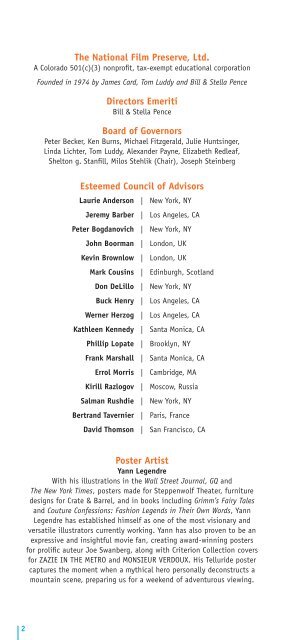Create successful ePaper yourself
Turn your PDF publications into a flip-book with our unique Google optimized e-Paper software.
Guest Director<br />
The National Film Preserve, Ltd.<br />
A Colorado 501(c)(3) nonprofit, tax-exempt educational corporation<br />
Founded in 1974 by James Card, Tom Luddy and Bill & Stella Pence<br />
Directors Emeriti<br />
Bill & Stella Pence<br />
Board of Governors<br />
Peter Becker, Ken Burns, Michael Fitzgerald, Julie Huntsinger,<br />
Linda Lichter, Tom Luddy, Alexander Payne, Elizabeth Redleaf,<br />
Shelton g. Stanfill, Milos Stehlik (Chair), Joseph Steinberg<br />
Esteemed Council of Advisors<br />
Laurie Anderson | New York, NY<br />
Jeremy Barber | Los Angeles, CA<br />
Peter Bogdanovich | New York, NY<br />
John Boorman | London, UK<br />
Kevin Brownlow | London, UK<br />
Mark Cousins | Edinburgh, Scotland<br />
Don DeLillo | New York, NY<br />
Buck Henry | Los Angeles, CA<br />
Werner Herzog | Los Angeles, CA<br />
Kathleen Kennedy | Santa Monica, CA<br />
Phillip Lopate | Brooklyn, NY<br />
Frank Marshall | Santa Monica, CA<br />
Errol Morris | Cambridge, MA<br />
Kirill Razlogov | Moscow, Russia<br />
Salman Rushdie | New York, NY<br />
Bertrand Tavernier | Paris, France<br />
David Thomson | San Francisco, CA<br />
Poster Artist<br />
Yann Legendre<br />
With his illustrations in the Wall Street Journal, GQ and<br />
The New York Times, posters made for Steppenwolf Theater, furniture<br />
designs for Crate & Barrel, and in books including Grimm’s Fairy Tales<br />
and Couture Confessions: Fashion Legends in Their Own Words, Yann<br />
Legendre has established himself as one of the most visionary and<br />
versatile illustrators currently working. Yann has also proven to be an<br />
expressive and insightful movie fan, creating award-winning posters<br />
for prolific auteur Joe Swanberg, along with Criterion Collection covers<br />
for ZAZIE IN THE METRO and MONSIEUR VERDOUX. His Telluride poster<br />
captures the moment when a mythical hero personally deconstructs a<br />
mountain scene, preparing us for a weekend of adventurous viewing.<br />
Photo: Anne Ray<br />
Each year, Telluride’s Guest Director serves as a key collaborator in the<br />
Festival’s programming decisions, bringing new ideas and overlooked films.<br />
Past Guest Directors include Laurie Anderson, Geoff Dyer, Buck Henry,<br />
Guy Maddin, Michael Ondaatje, Alexander Payne, B. Ruby Rich, Stephen<br />
Sondheim, and Caetano Veloso.<br />
Volker Schlöndorff<br />
Volker Schlöndorff is by any measure<br />
one of Germany’s greatest directors, but<br />
he’ll admit that he spent much of his<br />
youth dreaming of becoming French. Still<br />
a teenager when his family relocated<br />
from Wiesbaden to Paris, he went on to<br />
study philosophy at the Sorbonne and<br />
filmmaking at the legendary film school<br />
IDHEC. It was there that he befriended<br />
a classmate, Louis Malle, who hired<br />
Schlöndorff as assistant director on<br />
ZAZIE IN THE METRO (1960), the start<br />
of a prolific career as an assistant that<br />
included gigs for Alain Resnais (on LAST YEAR AT MARIENBAD) and<br />
Jean-Pierre Melville.<br />
Then, with Malle as his producer, Schlöndorff returned to Germany and<br />
made his debut feature, YOUNG TÖRLESS (1966), from Robert Musil’s<br />
novella about fascistic bullying in an Austro-Hungarian boarding<br />
school. It was a chilling, psychologically acute film that anticipated by<br />
several decades Michael Haneke’s THE WHITE RIBBON, and it announced<br />
Schlöndorff as the latest in the wave of young filmmakers who would<br />
come to comprise the New German Cinema. Among the others were<br />
Herzog, Kluge, Wenders, and of course Fassbinder, who in 1970 starred for<br />
Schlöndorff in a brilliant modern adaptation of Bertolt Brecht’s BAAL.<br />
It could not be denied that Schlöndorff had fully reconnected with his<br />
roots, and his best films have time and again returned to the subject of<br />
his country’s great and terrible journey through the 20th century. They<br />
include THE LOST HONOR OF KATHARINA BLUM (1975), a blistering portrait<br />
of an innocent woman undone by a lethal cocktail of state power, radical<br />
politics and tabloid sensationalism, made in partnership with Schlöndorff’s<br />
then wife, Margarethe von Trotta; COUP DE GRÂCE (1976), a magnificently<br />
doomed romance set against the German involvement in the Russian Civil<br />
War; and THE TIN DRUM (1979), from Günter Grass’ phantasmagorical novel<br />
of Germany before, during and after World War II. Many said that book<br />
could not, should not be filmed, but Schlöndorff’s movie is a masterpiece<br />
that captures Grass’ tale in all of its horrific, mordantly funny and oddly<br />
touching multitudes, with the singular child actor David Bennent as the<br />
boy who rails against an inhuman world by refusing to grow.<br />
In the decades since, Schlöndorff has been very much a man of the<br />
world, working in Europe and America, always with impeccable taste in<br />
source material. Few directors could seem as comfortable handling Musil,<br />
Proust, Arthur Miller (the TV version of DEATH OF A SALESMAN, with<br />
Dustin Hoffman) and the British pulp novelist James Hadley Chase. For<br />
a few years in the ‘90s, he even became a studio executive, helping to<br />
rehabilitate Germany’s famed Studio Babelsberg. And since discovering<br />
the magic of cinema, as a child after the end of World War II, he has<br />
established himself not only as one of its great practitioners, but also as<br />
a remarkably astute and deeply knowledgeable cinephile. Billy Wilder used<br />
to call Schlöndorff to talk about movies, and, perhaps more than any other<br />
living director, Schlöndorff understands the power of the moving image<br />
to shape our understanding of the world. His selections are a predictably<br />
unpredictable, provocative and impassioned group of masterpieces, each a<br />
necessity for any film lover to experience. –Scott Foundas<br />
2<br />
3


